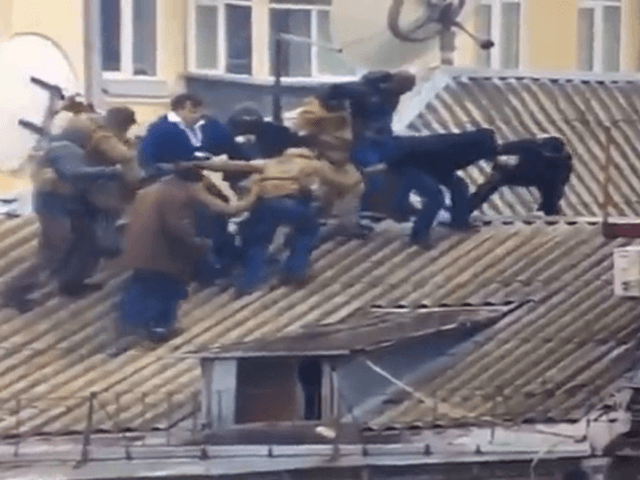Mikheil Saakashvili, the pro-West, stridently anti-Putin former president of Georgia, was reportedly arrested in Kiev, Ukraine, late Friday, days after a crowd of supporters freed him from police custody by force.
Saakashvili is facing charges of alleged collusion with the Russian government, charges he denies citing his career-long opposition to Russian President Vladimir Putin. The Ukrainian government, which granted Saakashvili citizenship in 2015 in order to appoint him governor of Odessa, charged him with taking money from pro-Russia “organized crime groups” days after Saakashvili called for a nationwide anti-corruption March against President Petro Poroshenko.
A year after taking the Odessa job, Saakashvili accused Poroshenko’s government of blocking his attempts to weed out corruption in the state and of participating in the corruption themselves. He founded a new populist party, the Movement of New Forces, inspired by the campaign of now-President Donald Trump.
Reuters confirmed that Saakashvili’s official Facebook account announced that he had been arrested on Friday night. The statement called for supporters to “protest at the pre-trial detention centre where he was being taken.”
Ukraine’s top prosecutor, Yuriy Lutsenko, later confirmed the arrest:
Ukrainian Prosecutor General Yuriy Lutsenko confirms @SaakashviliM in custody, being held in "temporary detention facility." Lutsenko says: "As promised, security forces did everything to avoid extreme force and bloodshed." https://t.co/z0KRj73fz1
— Christopher Miller (@ChristopherJM) December 8, 2017
Saakashvili was reportedly arrested in a friend’s apartment, where his Facebook account states he went after sleeping in a tent in front of Ukraine’s parliament for three days and contracting a cold. Saakashvili’s Facebook page “told supporters that he had lost his voice and was running a temperature but would ‘be by your side again’ at a midday march to Kyiv’s Independence Square,” according to Radio Free Europe/Radio Liberty (RFE/RL).
The successful arrest of Saakashvili follows two attempts to detain the now stateless political figure—he lost both his Georgian and Ukrainian citizenships—thwarted by crowds of supporters. On Tuesday, police cornered Saakashvili on the roof of his apartment building, where he threatened to jump before being arrested. Once in a police car, a crowd of hundreds of supporters surrounded him, pried the doors open, and brought him out. He then moved to a protest tent community in front of the parliament, where supporters protected him from law enforcement.
Following his arrest and liberation, Saakashvili reiterated that the charges against him were “completely absurd,” adding, “there is no more bitter foe of Putin in the world than me.”
On Tuesday night, police attempted to enter the tent community and arrest him again after Saakashvili told reporters he would not turn himself in to police. His supporters once again intervened and prevented police from entering the camp.
Saakashvili caused similar commotion in September when re-entering Ukraine. Poroshenko’s government had stripped him of his citizenship while on a trip to the United States, thereby invalidating his passport. The government of Poland granted him entry, accepting the validity of his passport, and Saakashvili then took a train into Ukraine. Supporters blocked border patrol from preventing his entry.
Poroshenko decried Saakashvili as a “criminal” and accused him of illegal immigration.
Saakashvili has since called for multiple protests before the Ukrainian parliament to remove Poroshenko. While he is leading the movement against Poroshenko, he has insisted that he has no ambitions of replacing him and is instead attempting to rescue the country “from the oblivion of corruption.” His status as a foreigner and citizen of no nation complicates the movement against Poroshenko, as it is unclear who, besides Saakashvili, would replace him if overthrown.
Before his arrest, Saakashvili had called for another rally against Poroshenko on Sunday.
As president of Georgia, Saakashvili led the peaceful anti-Russia, pro-West “Rose Revolution,” attracting greater American and Western investment in the country and adorning its capital, Tbilisi, into homages to America, including a statue of Ronald Reagan and a street named after George W. Bush. Putin responded by invading Georgia’s Abkhazia and South Ossetia regions in 2008, a conflict from which Georgia has yet to recover its territories completely.
Ukrainian Interior Minister Arsen Avakov once remarked of Saakashvili, “It’s a long time since I’ve seen such a bonkers populist.”

COMMENTS
Please let us know if you're having issues with commenting.